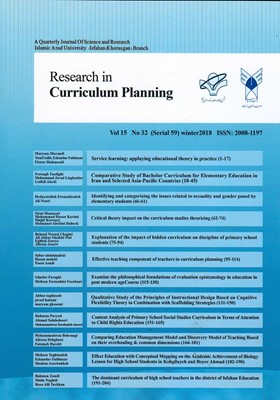The dominant curriculum of high school teachers in the district of Isfahan Education
Subject Areas : Research in Curriculum PlanningBahman Zandi 1 , simin naghsh 2 , rezaali Tarkhan 3
1 - Professor, Linguistics, University of Payamenoor, Tehran, Iran.
2 - Curriculum Studies, Islamic Azad University of Isfahan, Isfahan, Iran.
3 - Curriculum Studies, University of Tehran, Tehran, Iran.
Keywords: social performance approach, Curriculum, social reconstruction approach, scientific approach, learner-centered approach,
Abstract :
The purpose of this article was to investigate the Evaluation of a dominant curriculum of high school teachers in the district 3 of Isfahan Education. The method of this research regarding to aim was applied and regarding to data collection was cause and effect. The Sample was217 teachers (79 female and 137 male) that selected randomly from all high school teachers in district 3 and completed researcher made questionnair that designed in base of Askayros Categories (1992). Cronbach's alpha reliability index with spss20 software was obtained 0/78. The result showed that dominant approach of teachers in goals, teachers role and style of their evaluation, are Academic and social performance approach. And as a whole implemented in terms of these two approaches and two learner-centered and social reconstruction approach are below average. Furthermore, the teachers paid attention to scientific approach and social performance approach respectively.
Aghakhani A. Efficient and Effective Educational System and Other Countries’ Experiences (Japan) in This Case. Available on Web Site: Www.zibaweb.com.24th Esfand (2011).
Ahghari(1392), principles and curriculum issues first volume, Islamic Azad University, Science and Research Press (Persian).
Amin khandaghi; Pakmhr, Hamida (2013). Rule of St Discipline axial direction of artistic education curriculum Junior high school teachers: Challenges and injuries ". JournalNew approaches Isfahan University, accepting print (Persian).
Arnshtayn. Ellen C. and Hankynz (1384). Francis sought. Principles and curriculum issues. Translator: AH. Ahghari. Tehran: Islamic Azad University, Science and Research. (Persian).
Cheung, Derek (2000). Measuring Teachers Meta-Orientations to Curriculum: Application of Hierarchical Confirmatory Factor Analysis. The Journal of Experimental Education 68(2):149
Cimer, Atilla & Timucin. Melih (2010). Content of an in-service training to develop and assess activities minding critical thinking, procedia Social and Behavioral Sciences,9:958-962
Common, D. (1978). A Theoretical Model for Curriculum Implemntion. Doctoral Dissertation, Ottawa University. Retrieved on 10.03.2010 from. http://proquest.umi.com/pqdlink?
Deutsch, K. W. (1952). Oncommunication models in the social sciences. Public Opinion Quarterly. 16,356-380.
Fathiazar, Askandar (2003). Methods and Techniques of Teaching, Second Edition, Tabriz. (Persian)
H. Jafari Sani1, S.K. Alavi Langrodi2, H. Pakmehr (1395).Determining Portion of Curriculum Approaches Prediction on Students' Critical Thinking Attitudes in Humanities Pakmehr Quarterly Journal of Research in School and Virtual Learning Year 3, Number 12, Spring 2016 (P 37-48)(Persian).
Iannone, R. & Obenauf, P. (1999). Toward spirituality in curriculum and teaching. Education, Vol. 119.
Jenkins, s. b. (2009). Measuring teacher beliefs about curriculum orientations using the modified – curriculum orientations inventory, curriculum journal
Keeves, J. P. (1985). Modle and Modle Building: The International Encyclopedia of Education Research and Study. Pergaman Press, Volume 6, M-O.
Kridel, Craig (2010)Craig Kiel Encyclopedia of Curriculum, University of South Carolina,2010. (pp 822-4).
Maleki, Hassan (2011). lesson planning book (guide) Publishers Madreseh (Persian).
Mehrmohammadi. Mahmood (2013). Principles of curriculum development (Persian).
Mirzabeygi, Ali. (2001). Curriculum and lesson plans on formal education and training human resources. Tehran. (Persian).
Qaderi, Mustafa. (2012). Practice and theory studies curriculum. Publication light sound.Tehran (Persian).
Salsabil, N. (2003).View curriculum: harvest, compilation and patterns. Monograph No. 34.thran: Publications Education Research Center (Persian)._||_


